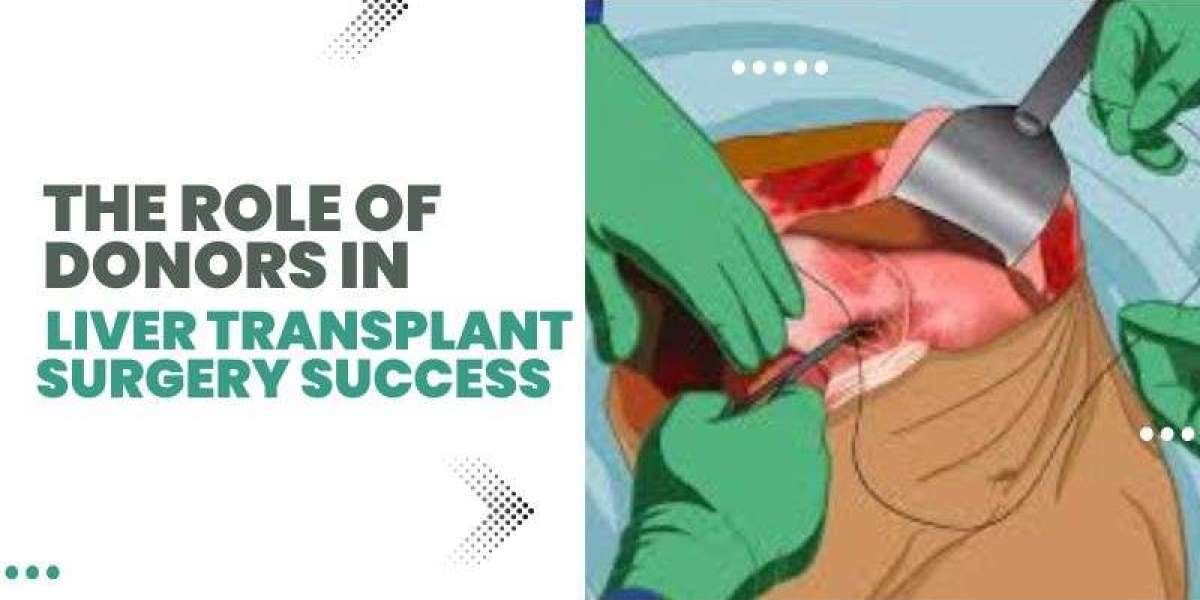Liver transplant surgery is a life-saving procedure that offers hope to individuals with end-stage liver disease or acute liver failure. The success of a liver transplant depends on several factors, but one of the most crucial aspects is the role of the donor. This blog will explore the role of donors in liver transplant surgery success, the importance of proper matching, and how liver transplant surgery cost is impacted by the donor's profile. Whether the donor is living or deceased, their contribution is vital in ensuring that the patient receives a functioning liver that can restore their health and quality of life.
Understanding Liver Transplant Surgery
A liver transplant surgery involves removing a diseased liver from a patient and replacing it with a healthy liver from a donor. The liver is one of the most important organs in the body, responsible for detoxifying harmful substances, producing proteins, and regulating various metabolic processes. When the liver fails, it can cause life-threatening complications. Transplant surgery is often the only option for patients with liver disease who no longer respond to medical treatments.
There are two main types of donors in liver transplant surgery: living donors and deceased donors. Each type plays a significant role in the overall success of the procedure.
The Role of Living Donors in Liver Transplant Surgery
Living donor liver transplant surgery is an increasingly common option, especially for patients who need a liver transplant but do not have a compatible deceased donor available. In this procedure, a portion of the liver is removed from a living donor and transplanted into the recipient. The liver has the remarkable ability to regenerate, so both the donor and the recipient’s liver will grow back to near normal size within a few months.
Living donors play a critical role in the success of liver transplant surgery. The transplant is often performed when the donor and recipient are closely matched in terms of blood type, liver size, and overall health. The closer the match, the better the chances of success. Since living donor liver transplants are typically elective surgeries, they can be scheduled in advance, reducing the time a patient has to wait for a transplant.
Moreover, living donor liver transplants generally have a higher success rate compared to deceased donor transplants. This is because the liver is removed from the donor while still functioning and is transplanted into the recipient without the stress of prolonged preservation, which can lead to organ damage in deceased donor livers.
The Role of Deceased Donors in Liver Transplant Surgery
Deceased donors also play a vital role in liver transplant surgeries. In this case, the liver is retrieved from a person who has passed away, usually after brain death. Since livers from deceased donors are typically stored for several hours before being transplanted, there are more risks involved compared to living donor transplants. The liver may undergo ischemic injury (damage from a lack of blood flow), which can affect the success of the transplant.
Matching the right donor to the right recipient is crucial for the success of a deceased donor liver transplant. This involves several factors such as blood type, liver size, and the patient’s medical condition. Transplant centers use a system of allocation based on these factors, ensuring the best possible match. While waiting for a suitable donor, patients may experience deteriorating health, making timely transplantation even more critical.
How Donor Quality Affects Liver Transplant Surgery Success
The quality of the donor liver is one of the most important factors in determining the success of the transplant. A healthy liver from a young, well-matched donor will have a significantly higher chance of successful integration into the recipient's body compared to a liver from an older or unhealthy donor. The organ's preservation, including how long it remains outside the body, also plays a crucial role in the transplant's outcome.
The Financial Aspect of Liver Transplant Surgery: Liver Transplant Surgery Cost
While the donor's health and compatibility are vital to the transplant’s success, liver transplant surgery cost is also an important consideration for patients. The financial aspect of liver transplantation involves various factors, including the cost of the surgery, medications, hospital stays, and post-transplant care.
Liver transplant surgery cost can vary widely depending on the location of the transplant, the complexity of the surgery, and the type of donor. A living donor liver transplant tends to be more expensive than a deceased donor transplant due to the costs associated with donor preparation, surgery, and post-surgery care. Additionally, the financial burden is also influenced by the need for lifelong immunosuppressant medications to prevent organ rejection.
Patients should also consider the ongoing expenses after the transplant, including regular check-ups, potential complications, and adjustments to lifestyle. Many health insurance plans cover a portion of these costs, but patients may still be left with significant out-of-pocket expenses.
The Psychological and Emotional Impact of Donors
While the medical and financial aspects of liver transplant surgery are often discussed, the psychological and emotional role of the donor is often overlooked. For living donors, the decision to offer a portion of their liver to someone in need is an incredibly selfless act. It requires careful consideration and counseling, as living donors must understand the potential risks involved in the surgery. After the surgery, living donors must also cope with the physical and emotional recovery process.
Deceased donors also play a significant emotional role in the transplant process. Their families, who make the decision to donate the deceased loved one's organs, often do so during an incredibly difficult time. The gift of life through organ donation can bring comfort to grieving families, knowing that their loved one’s liver can help save another person’s life.
Conclusion
The success of liver transplant surgery depends on many factors, but none are more critical than the role of the donor. Whether living or deceased, the donor's health, compatibility with the recipient, and the quality of the liver are all pivotal in determining the outcome of the transplant. Moreover, the financial implications of liver transplant surgery cost cannot be ignored, as these expenses affect both patients and donors. Ultimately, the decision to donate a liver—whether by living donors or deceased donors—is a profound act that can provide the gift of life, offering a chance for renewal to those suffering from liver disease.
For More Details:- (Click Here)



